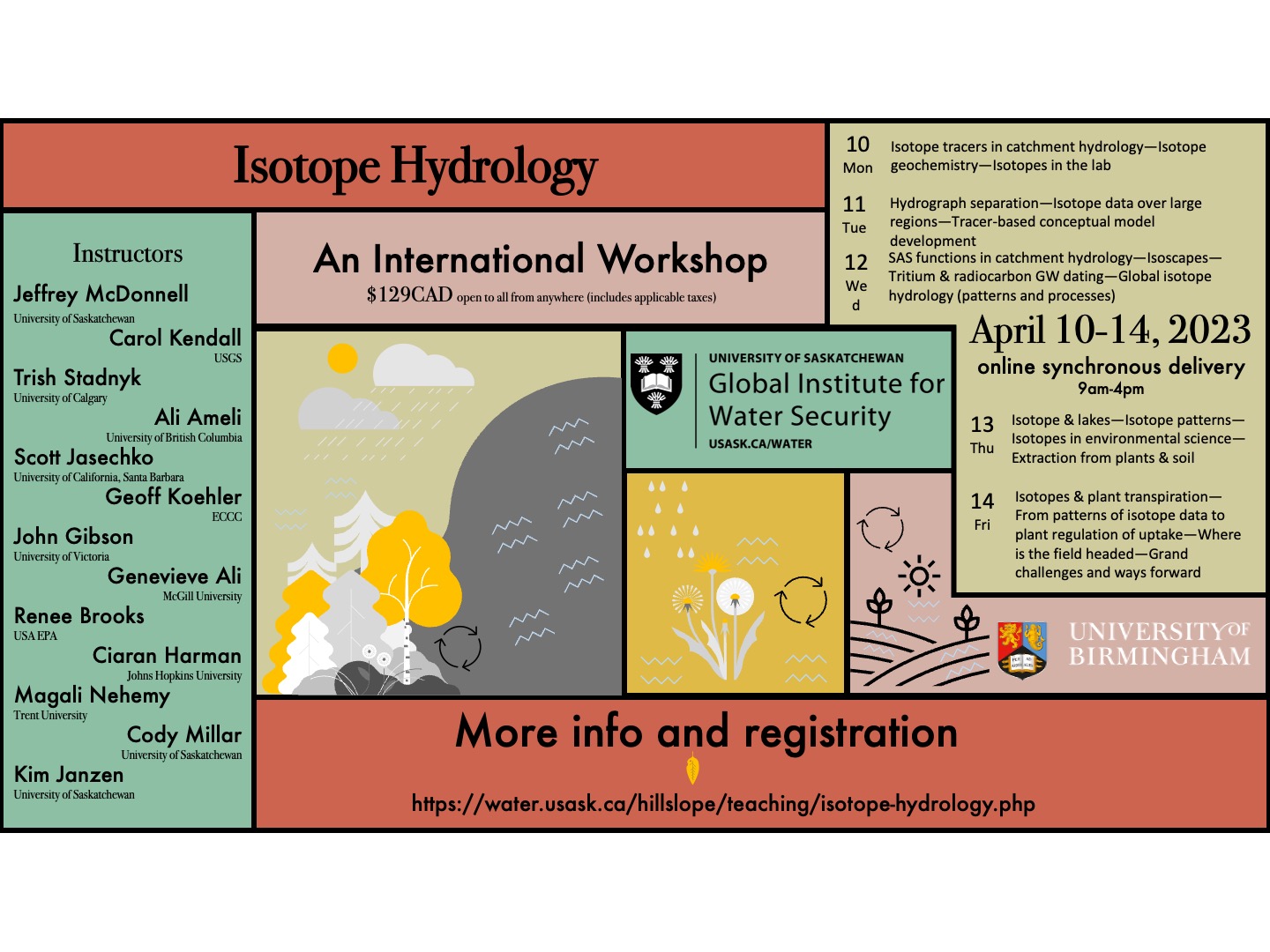
Class Description
International Workshop (Not for Credit Open to Anyone)
2023 Registration is now closed.
Location
Online via Zoom. The Zoom participation link has been emailed. If you did not recive it please check your junk mail or email Kim Janzen.
April 10th - 14th, 2023
Course Objective
This course will participants to the principles of stable isotope geochemistry applied to catchment hydrology and more broadly, to environmental research in the hydrosphere and biosphere. The course will focus on stable isotope measurement and tracing techniques and the linkage of these tracers in and among hydrologic and biological components of earth system at the catchment scale. We will specifically consider the application of stable isotope investigative tools to a variety of hydrological situations, ranging from water cycle dynamics, runoff processes, bio- and geochemical processes, nutrients and contamination and isotope ecohydrology.
Instructors
| Ali Ameli, University of British Columbia | Carol Kendall, USGS | Ciaran Harman, John Hopkins University |
| Cody Millar, University of Saskatchewan | Genevieve Ali, McGill University | Geoff Koehler, ECCC |
| Jeffrey McDonnell, University of Saskatchewan | John Gibson, University of Victoria | Kim Janzen, University of Saskatchewan |
| Magali Nehemy, University of Trent | Renee Brooks, US EPA | Scott Jasechko, University of California, Santa Barbara |
| Tricia Stadnyk, University of Calgary |
Schedule
2023 Lecture Schedule
All times are in Central Standard Time
Monday, April 10th (Overview day)
| 9-10am Introductions, course outline (McDonnell) | 1.30-2.30pm Isotope geochemistry 101 (Koehler) |
| 10.15-11.15am Catchment hydrology: A review (McDonnell) | 2.45-3.45pm Isotope hydrology in the lab: How it's done on laser specs and mass specs (Janzen & Koehler) |
| 11.30-12.30pm Isotope tracers in catchment hydrology (McDonnell) |
Tuesday, April 11th (What can be quantified with Isotopes?)
| 9-10am Hydrograph separation (Ali) | 1.30-2.30pm Transit time modelling (Ameli) |
| 10.15-11.15am Interpreting isotope data over large regions (Stadnyk) | |
| 11.30-12.30pm Tracer-based conceptual model development and testing at large scales (Stadnyk) |
Wednesday, April 12th (New techniques, new tracers, new scales)
| 9-10am SAS functions in catchment hydrology (Harman) | 1.30-2.30pm Global isotope hydrology: Global patterns (Jasechko) |
| 10.15-11.15am Tracing nutrient and organic matter sources with isotopes (Kendall) | 2.45-3.45pm Global isotope hydrology: global processes (Jasechko) |
| 11.30-12.30pm Tritium and radiocarbon of groundwater age dating (Jasechko) |
Thursday, April 13th (Lake evaporation, isotope biogeochemistry and ecology, water extraction)
| 9-10am Isotopes and lakes (Gibson—recorded) | 1.30-2.30pm Extracting water from soil and plant material (Millar) |
| 10.15-11.15am Quantifying lake evaporation rates in ungauged basins (Gibson—recorded) | 2.45-3.45pm Isotopes in other areas of environmental science: butterflies, birds, and bears, oh my (Koehler) |
| 11.30-12.30pm Isoscapes at the catchment scale (Brooks) |
Friday, April 14th (Plant water and soil water)
| 9-10am Isotopes and plant transpiration: quantifying where plants get their water (Nehemy) | 1.30-2.30pm Isotope hydrology: Grand challenges and ways forward (McDonnell) end of the workshop |
| 10.15-11.15am From patterns of isotope data to plant regulation of uptake (Nehemy) | |
| 11.30-12.30pm Where this hot field is headed (Nehemy) |
Registration for 2023 Closed
Workshop
Virtual Workshop not for credit and open to anyone from anywhere! Participation does not require any formal registration with the University of Saskatchewan. There is a nominal fee for registration through Eventbright. Registration in the virtual workshop will give you access to all five days of course lecture via online streaming and participation in all discussions.
The cost for the Workshop is $129 CAD (includes applicable taxes). Registration Now Open, click Here to register through Eventbrite. If you have any questions please contact Kim Janzen.
Please note that the class is being delivered synchronously so please ensure your time zone will allow you to participate.
Check your time difference Here.
The Zoom link has been emailed out to all participants.
Contact
For more information or questions about the class please contact Kim Janzen.
Class will be held online via Zoom, details and participation link will be emailed to participants April 6th after registration is finalized. If you don't receive the link, please check your junk folder or email Kim Janzen.
